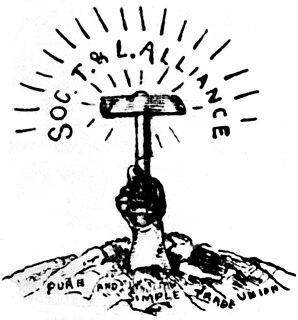Organisational history
Background
Prior to the formation of the Socialist Party of British Columbia in 1901, socialists in the Canadian province of British Columbia were split into approximately five small local groups, professing allegiance to several fledgling national organisations located outside the province. [1] In an effort to unify these scattered forces, a unity convention was held and the Vancouver-based Socialist Party of British Columbia (SPBC) was founded. [1]
Socialism is a range of economic and social systems characterised by social ownership of the means of production and workers' self-management, as well as the political theories and movements associated with them. Social ownership can be public, collective or cooperative ownership, or citizen ownership of equity. There are many varieties of socialism and there is no single definition encapsulating all of them, with social ownership being the common element shared by its various forms.

British Columbia is the westernmost province of Canada, located between the Pacific Ocean and the Rocky Mountains. With an estimated population of 5.016 million as of 2018, it is Canada's third-most populous province.
The Socialist Party of British Columbia (SPBC) was a provincial political party in British Columbia, Canada, from 1901 to 1905. In 1903, the SPBC won seats in the Legislative Assembly of British Columbia. The SPC never won seats in the House of Commons of Canada.
A strong American influence marked the new organisation, reflected in the group's leading personnel and programme. Chief provincial organiser of the SPBC was Ernest Burns, formerly an activist in the Social Democratic Federation in Great Britain before moving to North America where he organised for the People's Party and the Socialist Party in Washington. [2] The reform-oriented programme of the Socialist Party of America was adopted wholesale by the new Canadian group. [3]

The Social Democratic Federation (SDF) was established as Britain's first organised socialist political party by H. M. Hyndman, and had its first meeting on 7 June 1881. Those joining the SDF included William Morris, George Lansbury, James Connolly and Eleanor Marx. However, Friedrich Engels, Karl Marx's long-term collaborator, refused to support Hyndman's venture. Many of its early leading members had previously been active in the Manhood Suffrage League.
The People's Party was an agrarian political party in the United States. The Populist Party emerged in the early 1890s as an important force in the Southern United States and the Western United States, but the party collapsed after it nominated Democrat William Jennings Bryan in the 1896 United States presidential election. A rump faction of the party continued to operate into the first decade of the 20th century, but never matched the popularity of the party in the early 1890s.

The Socialist Party of Washington was the Washington state section of the Socialist Party of America (SPA), an organization originally established as a federation of semi-autonomous state organizations.
The initial moderate orientation of the SPBC proved unsatisfactory for the revolutionary socialist local organisation in Nanaimo, however, which soon broke from the SPBC to form the Revolutionary Socialist Party of Canada. Pressure was brought to bear to radicalise the party and in January 1902 at the second annual convention of the SPBC the Socialist Party of America's programme was scrapped and a new impossibilist document eliminating all "immediate demands" was adopted. [4] A reunification of the SPBC and the Revolutionary Socialist Party followed later that same year. [5] At the 1904 convention of the SPBC this organisation expanded its horizons, christening itself the Socialist Party of Canada (CPC), although remaining in practice a British Columbia-dominated group. [6]
Revolutionary socialism is the socialist doctrine that social revolution is necessary in order to bring about structural changes to society. More specifically, it is the view that revolution is a necessary precondition for a transition from capitalism to socialism. Revolution is not necessarily defined as a violent insurrection; it is defined as seizure of political power by mass movements of the working class so that the state is directly controlled or abolished by the working class as opposed to the capitalist class and its interests. Revolutionary socialists believe such a state of affairs is a precondition for establishing socialism and orthodox Marxists believe that it is inevitable but not predetermined.

Nanaimo is a city on the east coast of Vancouver Island in British Columbia, Canada. It is known as "The Harbour City". The city was previously known as the "Hub City", which has been attributed to its original layout design where the streets radiated out from the shoreline like the spokes of a wagon wheel, as well as its generally centralized location on Vancouver Island. Nanaimo is also the headquarters of the Regional District of Nanaimo.
This move to the left created a new layer of discontent, however, as so-called constructive socialists sought to shift the organisation's orientation from largely ineffectual radical propaganda to electoral politics. It was this disagreement over the programme and policies of the CPC which fueled a 1907 split and the formation of a new organisation known as the Social Democratic Party of British Columbia.
Reformism is a political doctrine advocating the reform of an existing system or institution instead of its abolition and replacement. Within the socialist movement, reformism is the view that gradual changes through existing institutions can eventually lead to fundamental changes in a society’s political and economic systems. Reformism as a political tendency and hypothesis of social change grew out of opposition to revolutionary socialism, which contends that revolutionary upheaval is a necessary precondition for the structural changes necessary to transform a capitalist system to a qualitatively different socialist economic system.
Formation of the Social Democratic Party of British Columbia was guided by Socialist Party founder Ernest Burns, who led a formal split from the CPC in May 1907. [7]
This page is based on this
Wikipedia article Text is available under the
CC BY-SA 4.0 license; additional terms may apply.
Images, videos and audio are available under their respective licenses.
The Labour Party is a social democratic political party in the Netherlands.

The Independent Labour Party (ILP) was a British political party of the left, established in 1893, when the Liberals appeared reluctant to endorse working-class candidates, representing the interests of the majority. A sitting independent MP and prominent union organiser, Keir Hardie, became its first chairman.

The Communist Party of New Zealand (CPNZ) was a Communist political party in New Zealand which existed from March 1921 until the early 1990s. Although spurred to life by events in Soviet Russia in the aftermath of World War I, the party had roots in pre-existing revolutionary socialist and syndicalist organisations, including in particular the independent Wellington Socialist Party, supporters of the Industrial Workers of the World in the Auckland region, and a network of impossiblist study groups of miners on the west coast of the South Island.

The Communist Party of Canada is a communist political party in Canada founded in 1921 under conditions of illegality. Although it is now a political party without any parliamentary representation, the party's candidates have been elected to the Parliament of Canada, the Ontario legislature, the Manitoba legislature, and various municipal governments across the country. The party has also contributed significantly to trade union organizing and labour history in Canada, peace and anti-war activism, and many other social movements.
The Social Democratic Party was a social democratic political party in Canada founded in 1911 by members of the right wing of the Socialist Party of Canada, many of whom had left the organisation in May 1907 to form the Social Democratic Party of British Columbia. These members were dissatisfied with what they saw as that party's rigid, doctrinaire approach. As opposed to the Socialist Party of Canada, the SDP allowed minority language groups ample room for self-determination, which led to a perception that the ethnic groups were more dominant than the overarching SDP. When the authorities cracked down on ethnic groups during the 1918 wave of repression, many of these individual ethnic chapters were shut down.
The Socialist Party of Manitoba (SPM) was a short-lived social democratic political party launched in 1902 in the Canadian province of Manitoba. The organisation advanced a moderate programme of social reform legislation. In 1904 the SPM became one of the constituent units founding the Socialist Party of Canada, an organisation which continued until 1925.

The Socialist Trade and Labor Alliance - commonly abbreviated STLA or ST&LA - was a revolutionary socialist labor union in the United States closely linked to the Socialist Labor Party (SLP), which existed from 1895 until becoming a part of the Industrial Workers of the World at its founding in 1905.
Socialism in Canada has a long history and is, along with conservatism and liberalism, a political entity in Canada.

Samuel "Sam" Mainwaring was a Welsh machinist and socialist political activist who was a founding member and key leader of the Socialist League, one of the first socialist political parties in Britain. In his later years, he turned from Marxist socialism to the libertarian socialist doctrine of anarcho-communism. He is best remembered as the father of the term "anarcho-syndicalism".
This article gives an overview of socialism in the Netherlands, including communism and social democracy. It is limited to communist, socialist, and social-democratic parties with substantial support, mainly proved by having had a representation in parliament. The sign ⇒ means a reference to another party in that scheme.

The Socialist Labour Party was a socialist political party in the United Kingdom. It was established in 1903 as a splinter from the Social Democratic Federation (SDF) by James Connolly, Neil Maclean and SDF members impressed with the politics of the American socialist Daniel De Leon, a Marxist theoretician and leading figure of the Socialist Labor Party of America. After decades of existence as a tiny organisation, the group was finally disbanded in 1980.
William Arthur "Bill" Pritchard (1888-1981) was a pioneer Canadian socialist politician and publisher. Pritchard is best remembered as a principal defendant in a 1920 sedition prosecution of nine socialist leaders in connection with the 1919 Winnipeg General Strike.
The Labour and Socialist International was an international organization of socialist and labour parties, active between 1923 and 1940. The group was established through a merger of the rival Vienna International and the former Second International, based in London, and was the forerunner of the present-day Socialist International.
The British Socialist Party (BSP) was a Marxist political organisation established in Great Britain in 1911. Following a protracted period of factional struggle, in 1916 the party's anti-war forces gained decisive control of the party and saw the defection of its pro-war Right Wing. After the victory of the Bolshevik Revolution in Russia at the end of 1917 and the termination of World War I the following year, the BSP emerged as an explicitly revolutionary socialist organisation. It negotiated with other radical groups in an effort to establish a unified communist organisation, an effort which culminated in August 1920 with the establishment of the Communist Party of Great Britain. The youth organisation the Young Socialist League was affiliated with the party.

The Russian Social Democratic Labour Party, also known as the Russian Social Democratic Workers' Party or the Russian Social Democratic Party, was a revolutionary socialist political party founded in Minsk, Belarus.












